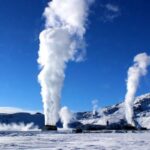We explain what natural resources are, their importance and what types exist. Also, how to preserve them and various examples.

What are natural resources?
natural resources are those elements of nature that human beings use to meet certain needs that guarantee their well-being or development. For example: water, trees and oil. These resources are valuable to societies because they contribute to their livelihood.
The care of natural resources is important, not only because they are the basis of modern productive societies, but because are an essential part of nature and are what allow the existence of living beings on planet Earth. Human activity exploits natural resources intensely, so there must be regulations in the different territories to control and prevent overexploitation of them.
See also: Alternative energies
Types of natural resources
There are two types of natural resources:
- Renewable resources Elements of nature that regenerate or renew themselves every certain period of time. For example: trees, solar radiation, wind. Likewise, they must be taken care of because excessive use can lead to their extinction.
- Non-renewable resources. Elements of nature that are limited in quantity, since their renewal cycle is slow compared to the rate of extraction or exploitation. They are resources that cannot be produced or reproduced by humans. For example: coal, metals, natural gas or oil.
Importance of natural resources

Natural resources are key elements within ecosystems since many of them, such as water or solar energy, perform vital functions for living beings. The presence of these factors in nature is what allows the planet and the individuals that inhabit it to survive.
Human beings use elements that they obtain from the natural environment to meet basic needs (such as food). Other resources (such as metal, oil or rock) are used for the production of tools and products in various industries such as textiles, transportation, metallurgical industries, among many others.
Natural resources must be cared for, Its excessive use has a negative impact on ecosystems and results in global warming, the clearing of forests and the reduction of flora and fauna species.
Conservation of natural resources
The responsible use of natural resources ensures a healthier and more balanced environment to make this message known, it is necessary to make people aware of the negative effects that the planet suffers from using its resources excessively.
Industrial activity is the main responsible for the extinction and consumption of elements from nature so it is important that companies develop production techniques that are not harmful to the environment and that they adapt new technologies that allow non-renewable resources to be replaced by renewable resources. For example: using wind or solar energy.
It is of great help that different states invest in technological advances and encourage the prudent use of resources. Furthermore, awareness must be generalized to the entire population because The responsible use of what is obtained from nature is important in everyday life of all people. For this, actions such as:
- Save water.
- Separate waste.
- Use means of transportation that do not pollute.
Examples of natural resources
Renewable resources:
- Solar energy
- wind energy
- Water
- Wood
- Tides
- Biofuels
Non-renewable resources:
- Oil
- Coal
- Natural gas
- Metals
References
- “Natural Resources” in ECLAC.
- “Natural resources” in World Wide Fund.
- “Natural resources” at the University of Calgary.
- “Overexploitation” in Greenpeace.
- “What are the consequences of the overexploitation of natural resources?” at Iberdrola.





